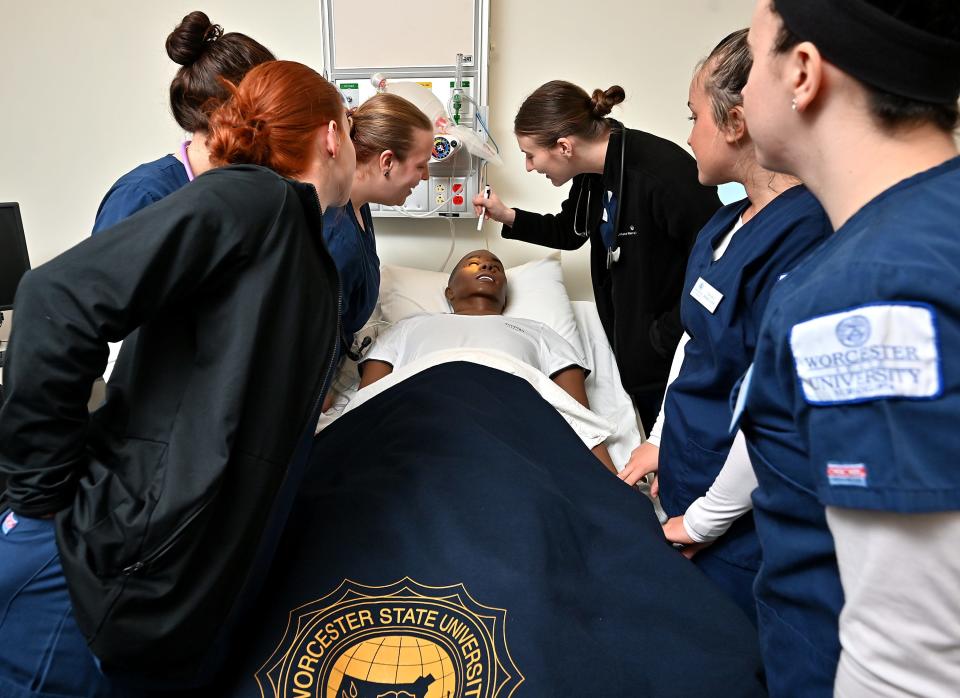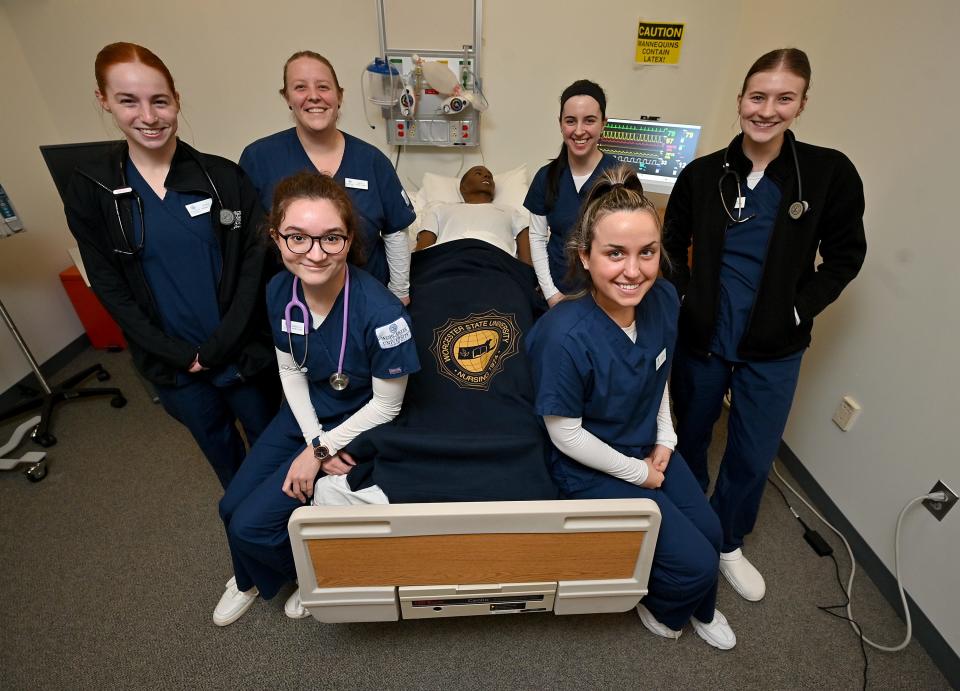Massachusetts needs a lot more nurses. Why that is, and how to fix it, is up for debate

WORCESTER ― There are two developments that some say could help alleviate a troubling nursing shortage in Massachusetts. One is a state law that expires on Sunday. The other is something called the Nurse Licensure Compact.
Before getting to those topics, there's a difference of opinion on whether the state faces an actual nursing shortage.
On the hospital administration side, one opinion comes from Justin Precourt, interim president at UMass Memorial Medical Center. His career includes decades as both a nurse and supervisor.
It all comes down to supply and demand, said Precourt. Simply put, there’s not enough supply of nurses to meet growing patient demand. Want proof? Precourt said thousands of nursing jobs posted daily statewide go unfilled.
The Massachusetts Nurses Association, the state’s largest union of registered nurses and health professionals, disagrees. It says there’s no shortage. The problem is hospitals and health care institutions limit hiring to keep expenses in check to maintain profit margins. Exorbitant pay for hospital executives also takes dollars away from hiring nurses, the union says.
To get a nursing school perspective, Worcester State University Associate Dean of Nursing Catherine Thomas said the nursing shortage is a nationwide challenge. While efforts are underway to boost enrollment in nursing programs, Thomas said retaining experienced nurses that are feeling exhausted, especially since the COVID-19 pandemic, is equally important.
The numbers
There are cracks in the system when it comes to the number of nurses in Massachusetts, according to a 2023 report by the state’s Health Policy Commission.
Registered nurse vacancy rates in acute-care hospitals doubled from 6.4% in 2019 to 13.6% in 2022, with especially high vacancy rates in community hospitals. In addition, employment in nursing and residential care facilities has not recovered since 2020, largely due to the COVID-19 pandemic, and remains 14% below 2018 levels.
The health care workforce nationally is in a state of “substantial disruption,” according to the report, and is experiencing “significant workforce shortages” at virtually all points of care. The COVID-19 pandemic exacerbated the impacts.
Another culprit cited in the report: a tight labor market. It sent workers to higher-paying jobs offered by better-resourced health care organizations. Some left for better-paying jobs in administration and research. Others left the industry due to burnout.
The impact of temporary labor can’t be underscored, according to the report. Health care organizations hired so-called traveling nurses to fill gaps. UMass Memorial Health spent $412 million on temporary help, including $292 million for temporary nurses, from 2020 through the end of February
What does it mean for patients?
Some experts say the answer is less access to needed care. Some patients are waiting weeks in hospitals for an available bed or for discharge to a nursing home or rehabilitation facility because those destinations are experiencing extreme staffing shortages.
Precourt believes in maintaining strong partnerships between hospitals and colleges to boost enrollment in nursing programs.
While enrollment in bachelor's degree programs in nursing had a slight uptick (0.32%) in Massachusetts from 2022 to 2023, enrollment in registered nursing programs dropped 11% over the one-year period, according to the American Association of Colleges of Nursing.
Worcester State averages 50 to 60 nursing graduates yearly, and most work in the Worcester area or Boston. One source of funds, the Nursing Pathways Expansion Grants, is helping to expand enrollment. At Worcester State University, the grants have helped hike enrollment by 10%, said Thomas.

UMass Memorial hires 300 nurses annually right out of school, said Precourt. The health system is fully staffed with nurses in its operating rooms, but that’s not the case in the emergency department.
The health system currently has 35 temporary "travelers" in the University Campus emergency department, representing a vacancy rate just under 15% for the system’s emergency department areas. Precourt explained special training is needed to work in those areas, as UMass has the only Level 1 Trauma Center in Central Massachusetts.
Getting a clinical placement is another factor. Nursing school students rely on these placements to gain valuable experience before graduation. However, many nurses in the field are struggling to serve their patients and don’t necessarily have the time to manage and train student nurses during a shift.
“Finding a clinical placement can be a challenge,” said Precourt. “You’re taking staff and asking them to support and train additional staff. It can slow down their day, it’s added work for them, and it’s a balance of how many students and trainees a nurse can absorb at any given time.”
Faculty: not enough of them
Meanwhile, a shortage of qualified faculty contributes to the shortage. There were 49 full-time faculty positions vacant in nursing schools in Massachusetts in 2023, compared to 29 in 2014, according to the American Association of Colleges of Nursing.
Budget constraints at colleges, an aging faculty and the lure of higher-paying clinical jobs contributed to the shortage, according to the association.
Lower pay in academia compared to clinical salaries is generally a given, said Thomas. Plus, many colleges and universities require nursing faculty to have doctoral degrees that are expensive and time-consuming to attain.
Thomas made the switch from nursing to academia, but said it’s not for everybody. "I worked full time while raising two small children, and went to school while taking care of my ill dad. I did it because I wanted to educate the next generation of nurses. But not everyone wants to go down that challenging path.”
Katie Murphy has worked as a registered nurse for 49 years, is an ICU nurse at Brigham and Women’s Hospital and serves as president of the Massachusetts Nurses Association. She said she lives the impact of the nursing shortage, describing moments when an ICU bed at the Brigham is empty because there isn’t a nurse to oversee it.
What's the solution?
As Murphy sees it, the problem isn’t a shortage. There are plenty of nurses, she said, and they all want to work. The state Board of Registration in Nursing reported a 19% increase in the number of registered nurses between June 30, 2019, (119,626) and Feb. 14, 2022 (148,518).
However, Murphy said hospitals must create "circumstances" like lower nurse-patient ratios, higher pay and providing staff the resources they need to do their jobs. If that doesn't happen, more nurses will feel burnout, retire early or leave the profession.
Looming deadline
There’s also a state law that some say helps relieve the nursing shortage in Massachusetts, and it expires on Sunday.
The law came on the books in 2020 during the COVID-19 pandemic. It allows students who graduated from an accredited nursing program but haven’t passed the state board exam to work in health care settings under the supervision of a licensed and experienced professional. Students in their last semester of study also can work under direct supervision.
Last March, Gov. Maura Healey extended the law for one year. It expires March 31, and both branches of the state Legislature included another one-year extension in their supplemental appropriations bills.
The Legislature was not in session on Friday, so Monday is the earliest when lawmakers could potentially vote on an extension. A request for comment from state Sen. Patricia Jehlen, D-Somerville, chairwoman of the Joint Committee on Labor and Workforce Development, was not immediately returned.
Precourt called the law a “game-changer” that has benefited community hospitals and small health care organizations with an influx of temporary staff that are closely supervised by experienced nurses.
“There’s no downside, only upside to extending,” he said.
Murphy doesn’t want the law extended. Nurses are too busy attending to patients, she said, to give adequate time to mentor student nurses. If students have a bad experience due to subpar supervision, Murphy worries they’re more likely to leave the profession.
Nurse Licensure Compact: two sides to coin
Meanwhile, some believe Massachusetts must join the Nurse Licensure Compact to help alleviate the nursing crunch.
It essentially allows licensed nurses in other states to come to Massachusetts and work with patients. Currently, a nurse licensed in another state needs to apply for a reciprocal license to work in Massachusetts. On the flip side, Massachusetts nurses could deliver care in other states.
Some believe the current requirement for out-of-state nurses to get a license to work in Massachusetts is time-consuming and expensive, a turnoff for those nurses to potentially coming here. Joining the compact would remove that barrier, they say.
“We absolutely need to participate,” said Precourt, who noted 10% to 15% of the candidate pool of temporary nurses don’t want to come to Massachusetts because it’s not in the compact. “I have yet to hear a viable argument why we wouldn't move forward with” joining the compact, he said.
The nurses union cited a 2016 study by the National Bureau of Economic Research that found little evidence the labor supply or mobility of nurses increased following the adoption of the compact in a given state.
“Specifically, we find no effect on labor force participation, employment levels, hours worked, wages or the probability of working across state lines,” the report stated. However, the report noted it was only a first step to identifying consequences of the compact and that more studies are needed, especially when it comes to the impact of telehealth or working in multiple states simultaneously.
There were 25 states in the compact when the study was done. Today, there are 41. “Furthermore, it is possible that the benefits of a cross-state system of occupational licensing will only accrue if the licensing regime is truly national,” said the report.
As Murphy sees it, the compact won't fix what she called a "structural problem in health care today."
"We have nurses in Massachusetts. Why not hire them? Give them benefits, and they will stay for 20 years in a hospital. I see that as a win-win," said Murphy.
The nurses association also supports a pending bill at the Massachusetts State House to establish safe nurse-patient ratios. The state Department of Public Health would hold public hearings and work with various groups to establish the ratios.
Final perspective
Thomas, of Worcester State, noted that while the health care system is complex, including the landscape for nurses, the bottom line is everyone wants what's best for patients.
"It helps to talk to each other, to make sure we're doing the best we can so the residents of Massachusetts get the best care they can," she said.
Contact Henry Schwan at henry.schwan@telegram.com. Follow him on X: @henrytelegram.
This article originally appeared on Telegram & Gazette: Mass. nurses shortage: What does it mean for your health?
